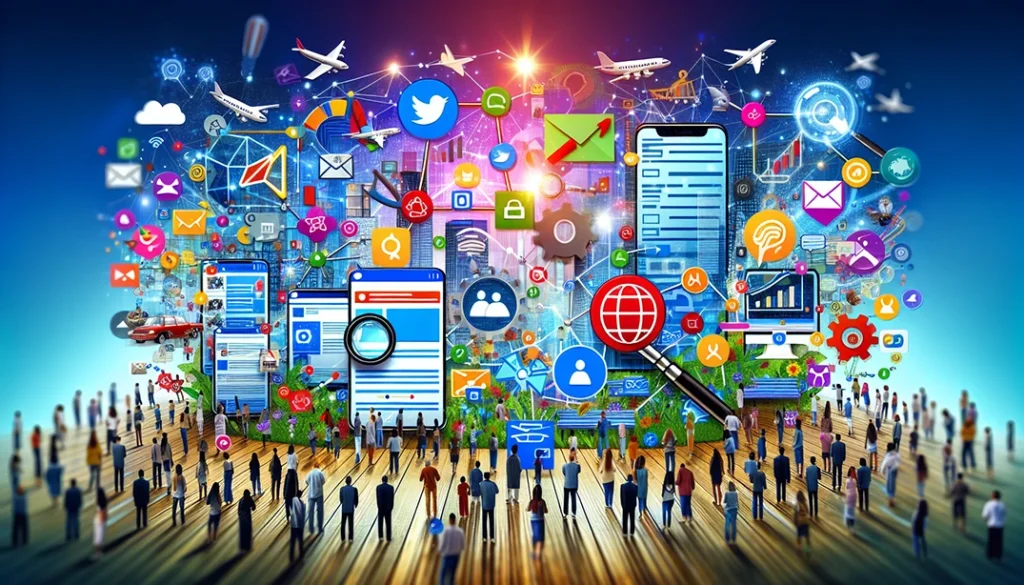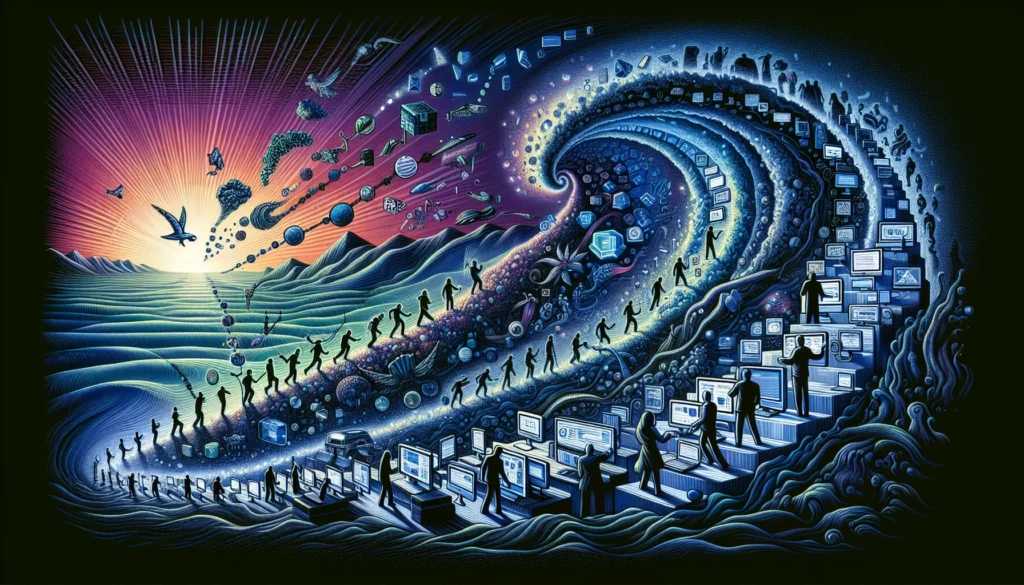Table of Contents[Hide][Show]
Digital marketing is the promotion of brands and products through digital channels, which is crucial for reaching today’s online consumers. This article strips away the complexity to give you a straightforward view of effective strategies, key benefits, and what trends are on the horizon. By the end, you’ll understand “what is digital marketing” and why it’s an invaluable tool for engaging customers and growing businesses in the digital age.
Insights
Digital marketing encompasses using the Internet and digital communication channels to promote brands, create dialogue, and form a community. It utilizes SEO, content marketing, social media advertising, and influencer engagement to resonate with potential customers.
Effective digital marketing strategies rely on setting SMART goals, understanding target audiences for personalized communication, and selecting optimal channels for message delivery. They focus on a mix of paid and organic reach to achieve the objectives.
Digital marketing statistics and trends for 2024 highlight a shift in social media metrics from engagement to retention, the introduction of new platforms like Threads, and the impact of technological advancements, data privacy, and sustainability on marketing strategy development.
Defining Digital Marketing: A Comprehensive Definition
What is digital marketing? Digital marketing is a vast ocean of possibilities, where every wave—a tweet, a search engine query, or an email—can carry a brand closer to its audience. At its core, digital marketing refers to brand promotion and brand positioning through the myriad channels of the digital world, a place where connections are forged in the blink of an eye. It is the art and science of utilizing the internet and other forms of digital communication not just to sell but to create a dialogue, to tell a story, and to build a community around a brand.
This realm is teeming with digital marketers, each wielding an arsenal of tactics from:
search engine optimization
content marketing
social media advertising
influencer engagement
These digital marketing tactics are the tools that power digital marketing campaigns, each tailored to echo the brand’s voice and resonate with potential customers. Whether it’s crafting a compelling narrative through content marketing strategy or navigating the intricate web of search engine marketing, these strategies work in concert to elevate a brand’s digital presence.
The importance of digital marketing cannot be overstated. In an era where traditional marketing channels often fall short of reaching the modern consumer, digital marketing opens up new avenues for engagement and conversion. The digital marketing strategy becomes the map that guides a business through the online marketing landscape, ensuring that every blog post, every digital ad, and every email marketing campaign contributes to a cohesive and impactful digital marketing tactic and narrative.
And yet, digital marketing is more than just an alternative to traditional marketing—it’s a revolution. It’s a shift in how we understand marketing campaigns, a redefinition of direct marketing, and an expansion of what it means to engage with a brand. In the digital age, marketing efforts transcend physical storefronts and print to digital ads everywhere, embracing the digital channels where today’s consumers live, work, and play.
Comparing Traditional and Digital Marketing
While both traditional and digital marketing aim to reach and engage audiences to drive brand awareness and sales, the methods and opportunities they present differ significantly.
Traditional Marketing: Time-Tested Tactics
Traditional marketing refers to the classic methods of advertising that have been used for decades. This includes:
Print media such as newspapers and magazines
Broadcast media like television and radio
Direct mail campaigns
Billboards and outdoor advertising
Telemarketing
These channels have a broad reach and can be particularly effective for targeting local audiences. However, traditional marketing methods often have higher costs and limited consumer interaction. Measuring the effectiveness of these campaigns can be challenging, and there is less flexibility to make quick adjustments after a campaign’s launch.
Digital Marketing: The New Frontier

Digital marketing, on the other hand, leverages the power of the internet and digital devices to connect with consumers. It redefines how you should deploy your marketing mix strategy with new tactics including:
Digital marketing’s strengths are its ability to target specific demographics, track and measure results in real-time, and interact directly with consumers. It offers personalization, immediate feedback, and a level of engagement that traditional marketing cannot match. With lower entry costs, digital marketing is accessible to businesses of all sizes, allowing for more nuanced and strategic campaigns that can be optimized on the fly.
The Blend of Both Worlds
While digital marketing has become increasingly dominant, traditional marketing still has its place. Many businesses find success in using a blend of both, creating comprehensive campaigns that leverage the tangibility and familiarity of traditional media and the precision and adaptability of digital methods. The key is understanding the unique advantages and limitations of each and crafting a marketing strategy that aligns with the brand’s goals and audience preferences.
The Evolution of Digital Marketing

The seeds of digital marketing were sown in the fertile ground of the 1990s as the World Wide Web took its first steps with the advent of Web 1.0. It was a time of exploration and innovation, with the launch of the first clickable banner ad in 1993 marking a pivotal moment when marketing campaigns began to venture into the digital realm. As the internet grew, so did the opportunities for brands to carve out their space online. The birth of search engines like Yahoo in 1994 and the rise of Google in 1998 opened new frontiers for digital marketing channels, setting the stage for the SEO and PPC strategies that would come to define effective digital marketing strategy.
Yet, with growth came turbulence. The dot-com bubble burst around 2000 and served as a harsh reality check, culling the herd and leaving behind those with the foresight and adaptability to seize the digital marketing mantle. During this time, the metrics of digital marketing began to crystallize, exemplified by a 2006 report highlighting the staggering volume of search engine traffic—a clear indicator of the internet’s central role in consumer behavior.
The digital marketing landscape continued to evolve with the invention of the tracking cookie. This simple yet revolutionary tool paved the way for personalized marketing campaigns and the intricate dance of data analytics that internet marketing would follow.
The emergence of Web 2.0 brought with it a new era of user-generated content and social media platforms. This transformed digital marketing into a two-way street where dialogue and engagement became just as valuable as the message itself and the road to marketing automation and martech stacks was paved. With the emergence of Web 3.0 on the horizon and Artificial Intelligence (AI) Marketing tools appearing everyday, marketers have to stay on top of trends so they are not left behind as the landscape continues to evolve.
Components of a Successful Digital Marketing Strategy
Crafting a successful digital marketing strategy is akin to assembling a complex puzzle where each piece—goals, audience, and channels—must fit perfectly to reveal the big picture. In the following subsections, we’ll dissect these components, exploring how:
Setting SMART goals provides direction
Identifying target audiences enables personalization
Selecting the right digital marketing channels ensures that a message not only reaches its intended recipients but resonates with them.
Setting SMART Goals
In the bustling world of digital marketing, setting SMART goals acts as a beacon, guiding campaigns through the fog of the competitive landscape. Specific goals tether digital marketing efforts to concrete business objectives, ensuring that every social media post, email, and inbound marketing campaign aligns with the brand’s vision. These goals are not mere aspirations but measurable milestones grounded in the rich analytics digital marketing channels provide, offering a quantifiable measure of success.
Attainable goals stretch digital marketers’ capabilities without snapping the thread of possibility, striking a balance between ambition and practicality. They are realistic, born from a deep understanding of the brand’s capabilities and the digital marketing landscape, and time-bound, instilling a sense of urgency and focus that drives marketing campaigns forward with purpose.
Thus, a SMART goal for a digital marketing strategy might be: “Increase organic website traffic by 25% in the next quarter through a targeted content marketing strategy and search engine optimization.” Here, specificity outlines the desired outcome, measurability is assured through web analytics, attainability, and realism are grounded in past performance data, and the time-bound nature establishes a clear deadline.
These structured goals are not only a testament to digital marketers’ project management acumen but also a commitment to a calculated and clear path. Through the lens of SMART goals, all digital strategy and marketing efforts are refined, assessed, and, ultimately, celebrated.
Identifying Target Audiences
Knowing your audience is the cornerstone of any effective digital marketing strategy. It’s the difference between a message that echoes in an empty room and one that reverberates through the halls of relevance, reaching those most likely to listen. Your audience can vary greatly depending on if you are a B2B or B2C business. For B2B companies, this means cultivating relationships and crafting content that supports logical decision-making. Conversely, B2C companies often focus on emotional appeals and enticing offers that captivate consumers.
The precision of digital marketing shines in its ability to:
Tailor campaigns to the individual
Use geo pages to capture the attention of local customers
Create targeted ads that speak directly to a user’s interests
The result is a higher caliber of leads—prospects engaged by personalized marketing efforts and are thus more likely to convert to customers.
Identifying target audiences involves:
Delving into the depths of customer data
Analyzing behaviors and preferences
Crafting digital marketing campaigns that feel less like broadside advertisements and more like personal invitations
This personal touch can transform potential customers into brand advocates, ensuring that marketing efforts resonate not just at the moment of contact but long after as a memorable and meaningful interaction.
As digital marketing continues to evolve, the ability to segment and target audiences becomes increasingly sophisticated. This empowers digital marketers to create experiences that are not just customized but also predictive, anticipating the needs and desires of the audience before they even express them.
Digital Marketing Channels
With goals set and audiences identified, the next step in a digital marketing strategy is selecting channels to broadcast your message. In today’s digital landscape, the options range from the algorithm-driven battleground of search engines to the intimate email marketing inbox. The challenge lies not in choosing a digital marketing channel but in selecting the right mix that will resonate with your target audience and achieve your SMART goals. A well-crafted digital marketing plan can help you navigate these choices and optimize your online marketing strategy.
Paid advertising plays a critical role, with PPC campaigns on search engines and paid ads on social media platforms offering the chance to leapfrog to the front of the line and capture immediate attention. However, the power of organic reach, achieved through SEO and content marketing, cannot be underestimated, as it builds a foundation of trust and authority that money can’t buy.
Mobile marketing, too, has risen to prominence, reflecting the ubiquity of smartphones and the shift towards on-the-go content consumption. Whether it’s SMS campaigns, social media notifications, or app alerts, reaching audiences on their mobile devices offers unparalleled immediacy and personalization. And let’s not forget the visual power of video marketing, which can capture and hold the audience’s attention in ways that text alone simply cannot.
The selection process must be fluid, allowing for shifts in strategy as audience behaviors and platform algorithms evolve. It’s a delicate dance, balancing the tried-and-true with the innovative while keeping a pulse on the ever-changing digital marketing landscape to ensure your message lands and leaves a lasting impression.
Key Benefits of Digital Marketing

The allure of digital marketing lies not just in its reach but in its precision and agility. One of its most compelling benefits is cost-effectiveness, as it democratizes the advertising space, digital marketing even allows the smallest of businesses to compete with industry giants. The granular control over advertising spend and the broader reach create a potent mix that can yield a high return on investment, unlike any traditional marketing channel.
Advanced analytics stand at the core of digital marketing, offering a window into consumers’ behavior and preferences. These insights allow businesses to:
Track campaign performance in real-time
Adjust tactics on the fly to better align with consumer trends
Enable a level of personalization that was once the stuff of science fiction
Provide targeted offers and content that speak directly to the individual’s product interests
The digital realm offers boundless opportunities for a digital marketing campaign, including:
Reaching audiences far and wide, regardless of geographic limitations and time zones
Utilizing a variety of content types and channels, such as engaging video content and interactive social media posts
Providing a rich tapestry of opportunities for customer engagement and conversion
Digital marketing’s benefits extend beyond the tangible metrics of clicks and conversions. It’s about:
Building a digital presence that aligns with the brand’s ethos
Creating a narrative that resonates with audiences on a deeper level
Fostering connections
Laying the groundwork for lasting relationships with consumers
In doing so, digital marketing becomes not just a tool for selling but a medium for storytelling.
Emerging Trends in Digital Marketing for 2024
As we stand on the threshold of 2024, the digital influencer marketing landscape is poised for a new wave of innovation. Social media platforms, the perennial giants of digital engagement, are reevaluating their metrics, shifting focus from mere engagement to retention, and recognizing the importance of cultivating a loyal and active audience. This subtle shift prompts digital marketers to think beyond the immediate allure of likes and shares, considering every social media post’s long-term value in their marketing strategies.
New Platforms
The introduction of new platforms like Threads signals a continued diversification of the social media ecosystem, offering fresh avenues for brands to increase brand awareness and connect with niche audiences. Similarly, organic engagement on professional networking platforms like LinkedIn is expected to surge, providing a fertile ground for B2B digital marketing strategies to flourish.
Technological Advancements
Technological advancements continue to profoundly shape digital marketing, with Google’s Search Generative Engine promising to revolutionize SEO by delivering more relevant and comprehensive answers to user queries. As a result, marketers will need to craft content that stands out even amidst the noise of AI-generated material, ensuring that their messages are heard and remembered.
Data Privacy and Sustainability
Data privacy and sustainability trends are carving out significant roles in developing digital marketing strategies. Today’s consumers are not just looking for the best deal but for brands that align with their values, respect their privacy, and contribute positively to society. As a result, marketers are tasked with weaving these themes into their campaigns, creating narratives that sell products and advocate for the greater good.
Digital Marketing Metrics & KPIs
In the engine room of digital marketing, metrics, and KPIs are the gauges and dials that monitor the health of campaigns. Digital Marketing KPIs are the compass that guides the ship, providing clear indicators of success and areas for improvement. The clarity with which these KPIs are defined and understood by all stakeholders is crucial, as it prevents misinterpretation and ensures that everyone is working towards the same objectives.
Regular reviews of KPIs act as checkpoints, allowing digital marketers to measure their progress and make data-driven decisions. Leading indicators give an early glimpse of a campaign’s trajectory, empowering teams to pivot away from ineffective tactics and double down on those that show promise. This focus on conversions and meaningful metrics sets successful digital marketing strategies apart from those that merely look good on paper.
However, the path to accurate KPI tracking could be more challenging. The complex web of customer interactions and touchpoints makes attribution modeling a daunting task, with data quality playing a critical role in accurately portraying a campaign’s influence on conversions. This challenge requires a keen analytical mind and a willingness to delve into the nuances of marketing technology, all in service of a digital marketing strategy that is effective and efficient.
Common Challenges & Solutions in Digital Marketing
Despite the many triumphs of digital marketing automation, the landscape has its trials and tribulations. Differentiating from competitors in a saturated market is a Herculean task that requires:
a distinctive value proposition
content that captures the imagination
creating a unique voice that can cut through the noise and resonate with the audience
something that speaks not only to the product’s features but to the story behind the brand.
Maintaining brand visibility is an ongoing battle, especially as algorithms governing digital visibility continue to change, often without warning. To keep a brand at the forefront of their minds, marketers must stay agile, adapting strategies to align with platform updates and consumer behavior shifts. It’s also a great practice to make sure your domain name includes your brand name to keep it front in center as you build your brand. It’s a game of anticipation and reaction, where the ability to pivot quickly can mean the difference between obscurity and prominence.
Ad blindness poses yet another hurdle as consumers grow increasingly adept at tuning out traditional advertising. To combat this, marketers are turning to innovative strategies that offer value beyond the sale—educational content, interactive experiences, or engaging storytelling. It’s about building a connection that transcends the transaction, fostering a relationship that endures beyond the initial click or conversion.
Summary
As our journey through the dynamic and multifaceted world of digital marketing comes to a close, we’ve uncovered the strategies that power compelling campaigns, the benefits that make digital marketing indispensable, and the trends shaping its future. The digital marketing landscape is ever-changing, but the core principles remain—know your audience, deliver value, and stay adaptable. With this in mind, you can chart your course through the digital expanse that not only achieves your small business marketing goals but also enriches the lives of your audience, all while maximizing your digital marketing successes. If the challenge seems too large to conquer, you might want to reach out to one of the top digital marketing companies to help you achieve your goals.
Frequently Asked Questions
What is digital marketing?
Digital marketing promotes a business using digital channels such as websites, social media, and online advertising to reach potential customers and generate sales. It encompasses various online strategies like SEO, email marketing, and mobile apps.
What exactly does a digital marketer do?
A digital marketer utilizes various digital channels to connect with target audiences, drive engagement, and achieve business objectives, such as building brand awareness and promoting products and services. This includes utilizing social media, search engines, email, content creation, and online advertising.
What role does content play in digital marketing?
Content is the backbone of digital marketing, as it engages, educates, and persuades audiences. High-quality, relevant content can improve SEO, drive traffic to a website, and establish a brand as a thought leader in its industry.
How has digital marketing evolved over time?
Digital marketing has evolved significantly since the 1990s, incorporating milestones such as the first clickable banner ad, the emergence of search engines like Google, and the introduction of social media. This evolution has resulted in diverse marketing channels and strategies catering to changing consumer behaviors.
How does digital marketing integrate with traditional marketing?
Digital marketing can complement traditional marketing by creating a cohesive brand experience across multiple channels. For example, a billboard can raise awareness, while online campaigns can further engage and convert the audience. Combining both can maximize reach and impact.

